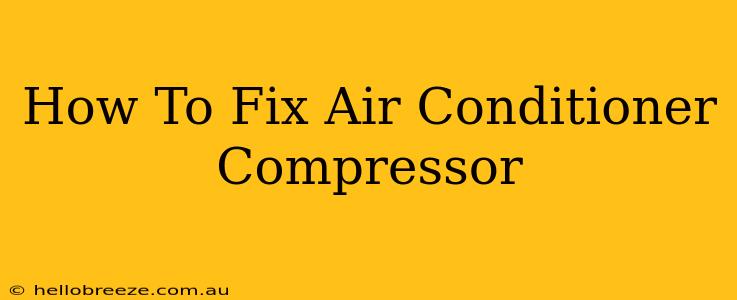Is your air conditioner struggling to keep you cool? A malfunctioning compressor is often the culprit. While some compressor issues require professional help, understanding the common problems and potential fixes can save you time and money. This guide will walk you through troubleshooting and potential solutions for your AC compressor. Remember: Working with refrigerant and electrical components can be dangerous. If you're uncomfortable with any of the steps, call a qualified HVAC technician.
Understanding Your AC Compressor
Before diving into repairs, let's understand the compressor's role. The compressor is the heart of your air conditioner, responsible for circulating refrigerant. This refrigerant absorbs heat from inside your home and releases it outside. A faulty compressor disrupts this cycle, leading to poor cooling or no cooling at all.
Common AC Compressor Problems:
-
Compressor Failure: This is the most serious issue, often requiring compressor replacement. Symptoms include a complete lack of cooling, strange noises (grinding, clicking, humming), and overheating of the compressor.
-
Refrigerant Leaks: Leaks deplete the refrigerant, hindering the compressor's ability to cool effectively. You'll notice a lack of cold air, and potentially frosting on the evaporator coils. Locating and repairing refrigerant leaks requires specialized equipment and expertise.
-
Electrical Problems: Issues with the wiring, capacitor, or starting relay can prevent the compressor from starting or running correctly. Symptoms include the compressor not turning on, intermittent operation, or unusual noises.
-
Overheating: Overheating can damage the compressor. This could be due to a lack of airflow around the condenser unit, dirty condenser coils, or a refrigerant leak.
Troubleshooting Your AC Compressor
Before attempting any repairs, always disconnect the power to the AC unit to prevent electrical shock.
1. Check for Obstructions:
Ensure that nothing is blocking the airflow to the condenser unit (the outdoor unit). Clear away debris, leaves, and any other obstructions.
2. Inspect the Condenser Coils:
Dirty coils restrict airflow, causing overheating. Clean the coils with a coil cleaning brush or a garden hose (low pressure).
3. Examine the Wiring and Electrical Components:
Carefully inspect the wiring for any loose connections, damage, or corrosion. Check the capacitor and starting relay for visible damage or swelling. Replacing these components requires electrical knowledge and should be done cautiously.
4. Listen for Unusual Noises:
Unusual noises like grinding, clicking, or humming indicate a potential problem. These sounds can pinpoint issues with the compressor's internal components or bearings.
5. Check the Refrigerant Level:
This step is best left to professionals. Low refrigerant levels indicate a leak. Improperly handling refrigerant can be hazardous.
When to Call a Professional
While some minor issues can be addressed, many compressor problems require professional attention. Call an HVAC technician if:
- The compressor is completely non-functional.
- You suspect a refrigerant leak.
- You're uncomfortable working with electrical components.
- You hear unusual noises from the compressor.
- You've attempted basic troubleshooting steps and the problem persists.
Preventative Maintenance:
Regular maintenance significantly extends your AC's lifespan, including the compressor. Schedule annual inspections and cleaning to catch potential problems early. This includes cleaning the condenser coils, checking refrigerant levels, and inspecting electrical components.
By following these troubleshooting steps and knowing when to call for professional help, you can keep your air conditioner running smoothly and enjoy cool comfort for years to come. Remember safety is paramount – prioritize safety when working with your air conditioning system.

